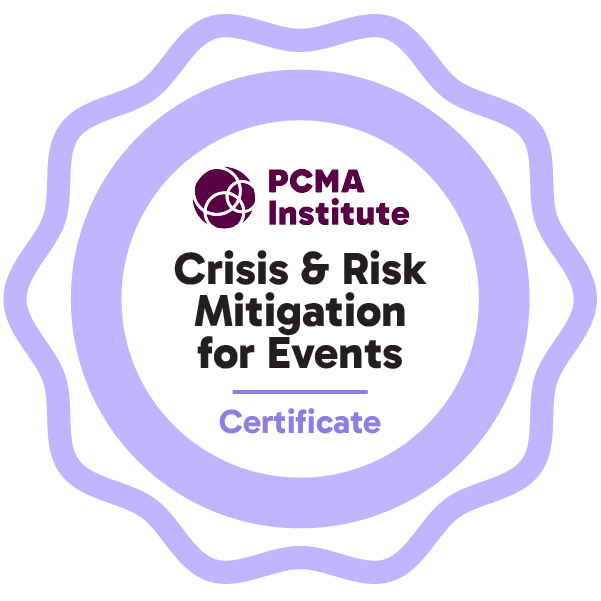Crisis Management & Risk Mitigation for Events Online Intensives

COURSE OVERVIEW
Business event professionals must be prepared for the unexpected while safeguarding their events’ and their participants’ safety. This dynamic two-session course delivered live online* dives deep into the critical elements of crisis and risk management.
Session 1 will cover the fundamentals of crisis management, including understanding the difference between risks and crises, the preparedness paradox, and how decision-making biases can influence outcomes. Through real-world case studies and expert insights, you’ll develop practical approaches for building situational awareness, team engagement, and risk response capabilities.
Session 2 will focus on aftermath and resilience. You will assess your crisis playbook, explore the concept of cascading losses, and engage in live crisis simulations to sharpen your rapid response skills. Featuring discussions with top communication experts, you’ll master the art of effective messaging during crises and learn how to counter misinformation.
You’ll leave this course with a personalized crisis management playbook tailored to your organization’s unique risks, as well as the confidence to navigate challenges both before and after your events.
*Due to the dynamic nature of the course content and the instructor’s expertise, this course is delivered in two parts and live online. If you cannot attend one of the session dates, we will record the session for viewing and follow-up with the instructor.
WHO IS THIS COURSE FOR?
- Business event professionals looking to strengthen their crisis management skills and develop a comprehensive risk mitigation strategy.
- Event organizers seeking to improve their ability to anticipate and manage disruptions, from minor setbacks to large-scale crises.
- Event leaders aiming to build an effective crisis communication playbook and ensure stakeholder buy-in for security and safety protocols.
- Professionals responsible for aligning their event’s risk planning with broader organizational goals and senior management expectations.
LEARNING OUTCOMES
- Develop a comprehensive understanding of the distinction between risks and crises, and how to apply crisis management strategies to safeguard your events.
- Create a personalized crisis management playbook tailored to your organization’s unique risks, preparing your team for both anticipated and unexpected disruptions.
- Gain practical insights from real-world case studies and expert discussions on corporate risk planning, crisis decision-making, and response strategies.
- Build situational awareness and stakeholder engagement to foster team collaboration and proactive crisis management during events.
- Master the fundamentals of crisis communication, including how to manage public messaging, combat misinformation, and maintain credibility during and after a crisis.
COURSE FORMAT
Online intensives are designed for busy professionals, delivered via live online instruction within one to two class sessions. While you may need to complete coursework outside of class hours, the majority of course content is delivered in a digital classroom setting. Recordings are available on-demand for course participants to revisit key sections.
Group Purchase

Session 1
- Introduction to Risk and Crisis Management: Understanding the unique nature of crises, preparing for unexpected events, and applying a recurring disaster framework (“assume the boom”).
- Defining Risk in Crisis Management: Exploring a five-part framework to manage risk and measure consequences, alongside the “preparedness paradox.”
- Making Risk Calculations: Recognizing six decision-making biases and concepts like the “gray rhino” and the normalization of deviance.
- Corporate Risk Planning Case Study: Insights from Airbnb’s safety and security strategies, with a focus on building situational awareness and team engagement.
- Building Core Capacities: Prioritizing elements before a crisis (“left of boom”) and understanding security architectures and governance structures.
- Building Response Capabilities: Strategies for after a crisis (“right of boom”), establishing credibility, and applying the “what-so-what-now-what” model.
- Assignment: Participants develop their own crisis management “playbook” by evaluating organizational risks and capacities.
Session 2
- Reviewing Risk Evaluation and Crisis Playbook: Assessing the strengths, challenges, and outstanding questions from participants’ playbooks.
- Cascading Losses: Strategies to avoid single points of failure, pivot during crises, and “fail safer.”
- The After-Action Review: Emphasizing the continuous nature of crisis preparation, with a focus on learning from mistakes and near misses.
- Communicating Risk and Response: Addressing misinformation during crises and effective risk communication strategies.
- Rules for Effective Messaging: Building and maintaining credibility, knowing your audience, and delivering clear, concise messages.
- In-Class Exercise: A rapid-response simulation to test participants’ crisis communication and response strategies.
- Looking Ahead: Building Resiliency: Stress testing vulnerabilities, adapting to changes, and overcoming resistance to change.

The PCMA Institute stands behind all of its content. If you feel you didn't learn what you expected to in this course, just let us know within 30 days of your last lesson and we'll give you a full refund. Click here to view our refund policy and full terms & conditions.
Ready to get started?
Feel free to get in touch with your questions

